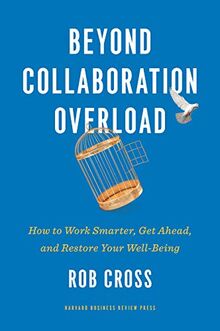
"Companies consume 85% of workers' time in collaborative activities. But they have no idea if all this collaboration benefits corporate performance, individual productivity, or employee well-being. Today's corporations are plagued by stress, loss of engagement, and attrition, which cripple them in their quest for a competitive edge. What's going on? Collaboration. Yes, that seemingly Good Thing all companies encourage is creating overload and burnout. It crushes our vitality and well-being, prevents us from being innovative, and blocks our companies from being the most successful organizations they could be. To some this is surprising. It's assumed that it's always better to collaborate more-and faster. But the toll of all this time on collaborative platforms, email, phone and video calls, meetings, and texts after work is far more severe than companies know. So what can be done? In his breakthrough research using network analysis and hundreds of in-depth interviews, Rob Cross has found the answer to collaboration overload. By taking action on three fronts, the best performers streamline collaboration and keep overload from derailing their careers. They use their freed-up time to invest in collaboration activities that drive performance by: mobilizing a broad network for scale, creating 'pull' by drawing people and ideas to them, engaging in renewal activities to promote well-being. High performers in today's hyperconnected world create enormous impact through their networks while, amazingly, spending the least amount of time on collaborative tasks. They don't do anything magical. They simply make sure that they collaborate only where they can add unique value-and only where collaboration provides unique value to them. You can do it too. And by applying these collaborators' best practices, you can reclaim a whopping 18 percent to 24 percent of your time-a workday every week-to invest in activities that contribute to your professional success and your overall well-being"--
© 2025 momox SE Berlin. Buy used CDs, DVDs, books, films and games cheaply and securely online.